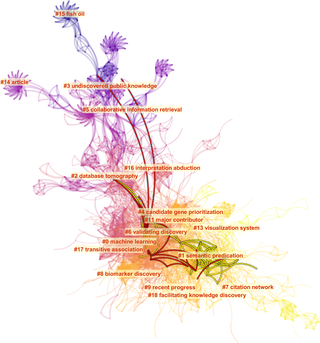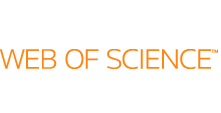
The Semantic Web, sometimes known as Web 3.0, is an extension of the World Wide Web through standards set by the World Wide Web Consortium (W3C). The goal of the Semantic Web is to make Internet data machine-readable.

Open access (OA) is a set of principles and a range of practices through which research outputs are distributed online, free of access charges or other barriers. With open access strictly defined, or libre open access, barriers to copying or reuse are also reduced or removed by applying an open license for copyright.
An annotation is extra information associated with a particular point in a document or other piece of information. It can be a note that includes a comment or explanation. Annotations are sometimes presented in the margin of book pages. For annotations of different digital media, see web annotation and text annotation.

Bibliometrics is the application of statistical methods to the study of bibliographic data, especially in scientific and library and information science contexts, and is closely associated with scientometrics to the point that both fields largely overlap.
Scientometrics is a subfield of informetrics that studies quantitative aspects of scholarly literature. Major research issues include the measurement of the impact of research papers and academic journals, the understanding of scientific citations, and the use of such measurements in policy and management contexts. In practice there is a significant overlap between scientometrics and other scientific fields such as information systems, information science, science of science policy, sociology of science, and metascience. Critics have argued that overreliance on scientometrics has created a system of perverse incentives, producing a publish or perish environment that leads to low-quality research.

Google Scholar is a freely accessible web search engine that indexes the full text or metadata of scholarly literature across an array of publishing formats and disciplines. Released in beta in November 2004, the Google Scholar index includes peer-reviewed online academic journals and books, conference papers, theses and dissertations, preprints, abstracts, technical reports, and other scholarly literature, including court opinions and patents.
Citation impact or citation rate is a measure of how many times an academic journal article or book or author is cited by other articles, books or authors. Citation counts are interpreted as measures of the impact or influence of academic work and have given rise to the field of bibliometrics or scientometrics, specializing in the study of patterns of academic impact through citation analysis. The importance of journals can be measured by the average citation rate, the ratio of number of citations to number articles published within a given time period and in a given index, such as the journal impact factor or the citescore. It is used by academic institutions in decisions about academic tenure, promotion and hiring, and hence also used by authors in deciding which journal to publish in. Citation-like measures are also used in other fields that do ranking, such as Google's PageRank algorithm, software metrics, college and university rankings, and business performance indicators.

In computing, linked data is structured data which is interlinked with other data so it becomes more useful through semantic queries. It builds upon standard Web technologies such as HTTP, RDF and URIs, but rather than using them to serve web pages only for human readers, it extends them to share information in a way that can be read automatically by computers. Part of the vision of linked data is for the Internet to become a global database.

The Web of Science is a paid-access platform that provides access to multiple databases that provide reference and citation data from academic journals, conference proceedings, and other documents in various academic disciplines. Until 1997, it was originally produced by the Institute for Scientific Information. It is currently owned by Clarivate.
Open peer review is the various possible modifications of the traditional scholarly peer review process. The three most common modifications to which the term is applied are:
- Open identities: Authors and reviewers are aware of each other's identity.
- Open reports: Review reports are published alongside the relevant article.
- Open participation: The wider community are able to contribute to the review process.
Observations and Measurements (O&M) is an international standard which defines a conceptual schema encoding for observations, and for features involved in sampling when making observations. While the O&M standard was developed in the context of geographic information systems, the model is derived from generic patterns proposed by Fowler and Odell, and is not limited to geospatial information. O&M is one of the core standards in the OGC Sensor Web Enablement suite, providing the response model for Sensor Observation Service (SOS).
The Semantic Sensor Web (SSW) is a marriage of sensor web and semantic Web technologies. The encoding of sensor descriptions and sensor observation data with Semantic Web languages enables more expressive representation, advanced access, and formal analysis of sensor resources. The SSW annotates sensor data with spatial, temporal, and thematic semantic metadata. This technique builds on current standardization efforts within the Open Geospatial Consortium's Sensor Web Enablement (SWE) and extends them with Semantic Web technologies to provide enhanced descriptions and access to sensor data.
ResearcherID is an identifying system for scientific authors. The system was introduced in January 2008 by Thomson Reuters Corporation.
OpenCorporates is a website that shares data on corporations under the copyleft Open Database License. The company, OpenCorporates Ltd, was incorporated on 18 December 2010 by Chris Taggart and Rob McKinnon, and the website was officially launched on 20th.
Scholarly peer review or academic peer review is the process of having a draft version of a researcher's methods and findings reviewed by experts in the same field. Peer review is widely used for helping the academic publisher decide whether the work should be accepted, considered acceptable with revisions, or rejected for official publication in an academic journal, a monograph or in the proceedings of an academic conference. If the identities of authors are not revealed to each other, the procedure is called dual-anonymous peer review.

UMBEL is a logically organized knowledge graph of 34,000 concepts and entity types that can be used in information science for relating information from disparate sources to one another. It was retired at the end of 2019. UMBEL was first released in July 2008. Version 1.00 was released in February 2011. Its current release is version 1.50.
In natural language processing, linguistics, and neighboring fields, Linguistic Linked Open Data (LLOD) describes a method and an interdisciplinary community concerned with creating, sharing, and (re-)using language resources in accordance with Linked Data principles. The Linguistic Linked Open Data Cloud was conceived and is being maintained by the Open Linguistics Working Group (OWLG) of the Open Knowledge Foundation, but has been a point of focal activity for several W3C community groups, research projects, and infrastructure efforts since then.

Microsoft Academic was a free internet-based academic search engine for academic publications and literature, developed by Microsoft Research in 2016 as a successor of Microsoft Academic Search. Microsoft Academic was shut down in 2022. Both OpenAlex and The Lens claim to be successors to Microsoft Academic.

Pascal Hitzler is a German American computer scientist specializing in Semantic Web and Artificial Intelligence. He is endowed Lloyd T. Smith Creativity in Engineering Chair, one of the Directors of the Institute for Digital Agriculture and Advanced Analytics (ID3A) and Director of the Center for Artificial Intelligence and Data Science (CAIDS) at Kansas State University, and the founding Editor-in-Chief of the Semantic Web journal and the IOS Press book series Studies on the Semantic Web.








